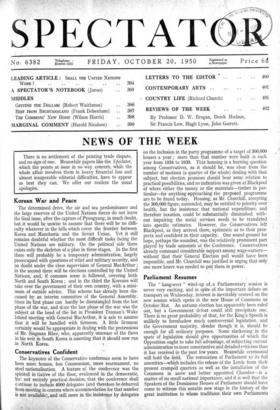Conservatives Confident
The keynotes of the Conservative conference seem to have been more houses, less Communism, more rearmament, no steel nationalisation. A feature of the conference was the spirited in tiative of the floor, evidenced in the democratic, but not entirely practical decision, that the conference shall continue to include 4000 delegates (and therefore be debarred from meeting in centres where accommodation for that number is not available), and still more in the insistence by delegates on the inclusion in the party programme of a target of 300,000 houses a year ; more than that number were built in each year from 1934 to 1939. That housing is a burning question among Conservatives, as it should be, was clear from the number of motions (a quarter of the whole) dealing with that subject, but election promises should bear some relation to practical possibilities, and no indication was given at Blackpool of where either the money or the materials—timber in par- ticular—for anything approaching the proposed programme are to be found today. Housing, as Mr. Churchill, accepting the 300,000 figure, contended, may be entitled to priority over health, but the insistence that national expenditure, and therefore taxation, could be substantially diminished with- out impairing the social services needs to be translated into specific estimates. However, the Conservatives left Blackpool, as they arrived there, optimistic as to their pros- pects and confident in their capacity. One sound ground for hope, perhaps the soundest, was the relatively prominent part played by trade unionists at the Conference. Conservatives already command considerable support among wage-earners— without that their General Election poll would have been impossible, and Mr. Churchill was justified in urging that only one more heave was needed to put them in power.


















